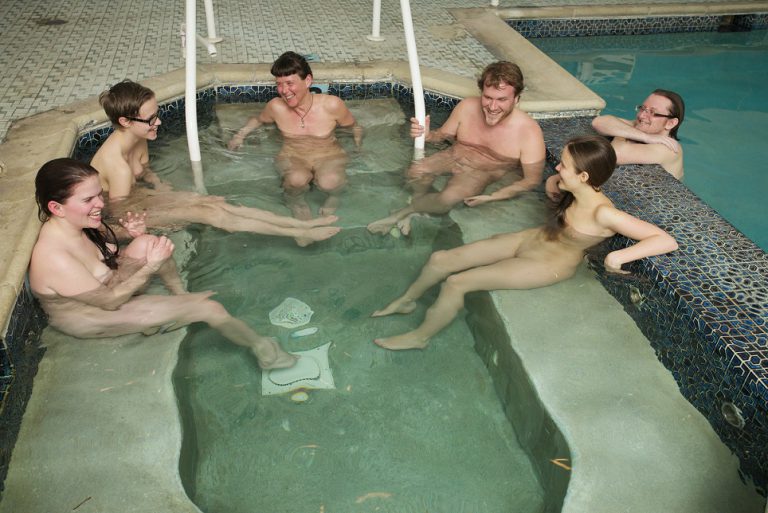[LONG POST]
I’ve been thinking, again, about naturism & nudity, and our attitudes towards it.
As many here will know, I had a somewhat bohemian upbringing in the 1950/60s.
- Nudity was considered normal.
- Little (rooms, books etc.) at home was off limits.
- Internal doors, including the bathroom door, were never shut unless we had visitors. Even in my mid-20s when N was visiting and we were sleeping together, my bedroom door was always at least ajar.
- Many times I would stand in the bathroom talking with my mother in the bath; and I was regularly conscripted to scrub my father’s back.
- At around age 8/9/10 we had two, 2-week, holidays at a nudist club. While this was doubtless for my education, my parents must both have been up for it themselves. Subsequently things within the family conspired to restrict holidays, and nudist club visits, rather than my parents becoming disinterested.
OK so like all teenagers I went through the phase of not wanting to be parading around the school changing rooms in the nude. But I don’t think I was worse than average about this, and indeed probably less so. And from the time I was a student it has bothered me not one iota. As soon as I had a student room to myself I slept in the nude, and have continued to do so ever since (barring the odd occasion in hospital) – I don’t even possess a pair of pyjamas, and haven’t done for 30 years or more!
Now I spend as much time as possible in the nude when at home. At this time of year, when it’s warm, I will don a pair of shorts if I have to go further than 6 feet from the back door, if I have to answer the door, or there is anyone other than N in the house. I wear clothes to cover other people’s embarrassment. I’m naturally warm (the blubber helps) so even in winter I’ll mostly wear a t-shirt and lounging bottoms – you know it’s really cold if I put on a sweater and socks. Sure it helps that we have a naturally warm house; and no, we don’t run the heating 24/7 or on a high temperature – the thermostat is set at about 20°.C and the timer is still set as it was when we were working: on for a few hours morning and evening.
Why do I do this? Well firstly because I find it comfortable; not that I find clothes particularly uncomfortable. Secondly, it is more ecologically sound: fewer clothes to buy (I have a wardrobe full and need few now I’m not working), and less washing (less water, detergent, energy used). And thirdly because it is healthier: the more fresh air one gets to body parts, especially sticky/icky ones, the better they are; less itchy etc. Overall it just feels right and natural. If it was good enough for Benjamin Franklin, who took a daily “air bath” it’s good enough for me.
Given all that, I struggle to understand why most people have issues with nudity. It seems to be no more than conditioning, originally imposed by patriarchal religion. Religions in general imposed clothing as the norm because they perceived it as reducing sexuality (wrong!) and wanting to keep the populous under control. So of course political entities from Lords of the Manor to national governments were going to jump on the bandwagon. This in turn has engendered a self-perpetuating prudishness. As author Mokokoma Mokhonoana has said “It’s the invention of clothes, not nature, that made ‘private parts’ private”.
No, don’t come at me with “But it’ll corrupt the children”, because it won’t. As I’ve written here before British Naturism have looked at this in some depth and concluded it will do the opposite of “corrupting” children. They’re even backed by child psychologist Lee Salk (1926-1992) who observed [McCall’s magazine, June 1976]:
Being natural and matter-of-fact about nudity prevents your children from developing an attitude of shame or disgust about the human body. If parents are very secretive about their bodies and go to great lengths to prevent their children from ever seeing a buttock or breast, children will wonder what is so unusual, and even alarming, about human nudity.
And research by academic Keon West has also found that nudity generally improves body image.
Naturally, people from ancient times onwards have wanted some form of clothing – anything from an animal skin to a fleecy nylon onesie – for warmth, when needed. But that doesn’t account for the need to wear a bikini or speedos on a boiling hot Caribbean beach (or in the swimming pool, or gym).

So where, and why, is there a problem? Why in these more liberal times can we not throw off the shackles of prudishness and patriarchal religion? What can we do to shift our thinking and quell our hang-ups?
I recall in the mid-1970s, when I was a Resident Tutor at university and sitting on a university accommodation committee, there was a move not just for mixed student residences but mixed corridors in the residences. A couple of the older Accommodation Office staff had apoplexy; while the students and I all said “Where’s the problem?”. Students can lock their doors; there are doors on the toilet cubicles, the bath and at least a curtain on the shower (which could easily be made to fasten at both sides, or be replaced by a door). I don’t know if his was implemented as I left at the end of that academic year, but it was a big step to even be discussing it in 1975/6.
So while it is not the full answer, and not something which could be instituted overnight, I’ve long been in favour of not just mixed sports but mixed changing rooms. When I was a student I regularly played squash against girls of my acquaintance (boys too). I remember thinking then how daft it was that at the courts there were two changing rooms (male & female), each comfortably sized for maybe six or eight people but each invariably being used by only one or two at a time. How much more efficient to combine the changing rooms to make one space for eight, with just one loo and one shower cubicle. Moreover I feel morally certain that the girls would have a civilizing influence on the less savoury habits of the male (think smelly socks and sports bags).
Why could this not be extended to all changing rooms? And make swimming pools & gyms “costumes optional”? Really, where is the problem. What do you mean “It’s not nice!”; “It would be a rampant orgy” or “There’ll be two rapes an hour”? That’s just rubbish. Think about it …
- Give or take the odd scar (and scars tell interesting stories), we all know what’s under your t-shirt and jeans, my t-shirt and jeans. So we can hardly claim to be surprised.
- We all know that people have hairy bits, and some people shave them – just like some men shave their faces and others have beards.
- We all know that women have periods, get pregnant, go through the menopause; and we all know men have erections (sometimes involuntary). Again, we can hardly claim to be surprised.
- At some point in our lives (and for many of us, most of our lives) we’re going to live with, or at least flat share, with someone of the opposite sex – even the homosexuals (of both genders) and asexuals are likely to do so somewhere along the way. So we have “domestic exposure” to the opposite sex in a non-partnered, non-family, situation, and it isn’t a sexual free-for-all.
- We have to live and work in a mixed community. And, if we think about it at all, we all recognise that clothing is actually much more sexual than nudity. Men are not rampant sex maniacs; neither are women. Nudity is much more boring than clothing; and a great social leveller – no fashion etc.
Yes, of course we would have toilet cubicles with doors, and maybe even a few cubicles for those who feel an overwhelming need for modesty when changing (transgender people in transition, perhaps). Beyond that where is the need? Really?
OK I’ll buy that it would be strange at first and take time for people to become accustomed; but over time, as younger generations are increasingly brought up this way, and the rest of us adjust, it would be a natural part of life. Think how the Scandinavians find mixed saunas perfectly normal.
And from there it would be only a short step to the acceptance of public nudity as a lifestyle choice.








